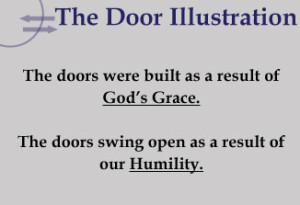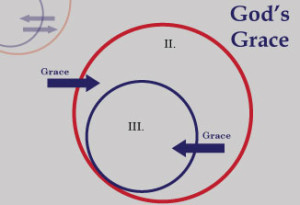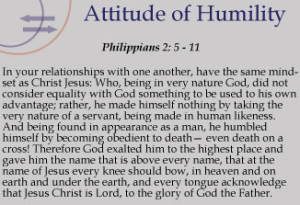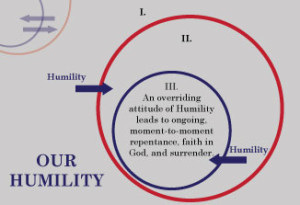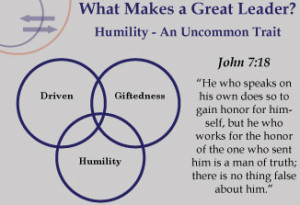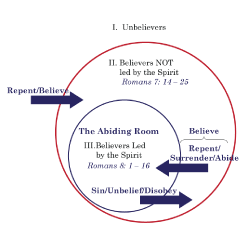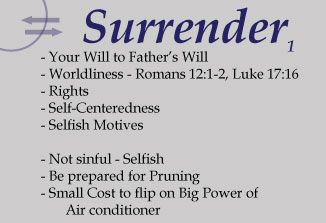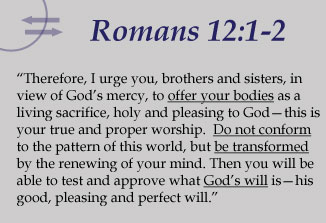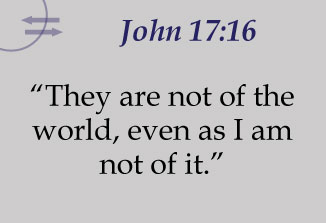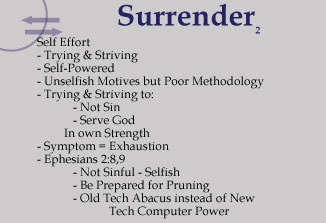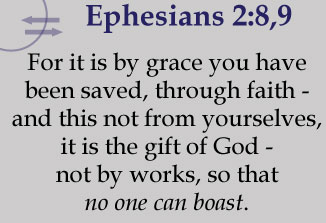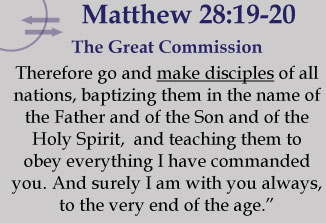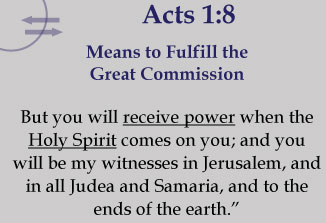SURRENDER
Two Types
(View Surrender Summary)
Surrender 1. In my opinion, there are two specific types of surrender. (View First Type of Surrender) The first type is worldly surrender—surrendering the things of the world. So, these are things that are not sin, they are not sinful, but they are selfish. You surrender your will to the Father’s will. Things like: Your right, self-centeredness, selfish motives. An example is if I had a hobby, and this hobby is taking time away from Christ, and God wants me to surrender that to Him, but I am caught up in the world, and insist on keeping my hobby (in effect, as my god), I need to surrender that. So, I need to give up whatever the things of the world may not be sin, but the things of the world—my worldliness. I need to give that up and surrender to God in order to abide in Christ, and think of Him only, and be filled and led by His Spirit. That is the first surrender that I talk about (worldliness). Romans 12: 1-2 says, “Therefore I urge you brothers, in view of God’s mercy, offer your bodies as living sacrifices wholly and pleasing to God. This is your spiritual act of worship. Do not conform any longer to the pattern of this world, but be transformed by the renewing of your mind, then you will be able to test and see what God’s will is—the good and perfect will.” (View Romans 12:1-2) We want to know what God’s will is for our life. We need to pray something like: Jesus, do you want me to buy this house? Do you want me to buy this car? Which career path do you want me on? That is the wrong question. You can ask what God’s will is for my life? A better question is: What is God’s will? God’s will is that you repent of sin, cleanse the temple, which is you; surrender to the Father’s will, abide in Christ, and be filled with the Spirit, and believe. That’s God’s will. All the rest, which house you buy, which car you buy, what your career path is, who you marry—all of those types of things fall into place as we get the big picture here, and just walk with God. He’s able to orchestrate our lives for the other things that we usually pray about.
The example I use in surrendering (surrender worldliness), is this: It was a fairly tragic situation, but you may have heard that here in Phoenix, temperatures got so high in the summer, three people died because of the heat. Three people died of heat that had air conditioners. They did not turn on their air conditioner. They died of the heat last summer because they would not turn on their air conditioner. They talked to the family and friends of these three people who died and said, “Why if they had air conditioning, did they not turn it on?” The family and friends said, “Because they wanted to save some money.” In effect, what they did was they said, “It costs too much to turn on the air conditioning, and because they would not pay the cost to turn on the air conditioner, it cost them their life. It was death, and we, too often, are not willing to pay a small cost like the surrender of little things in our life. Hobbies, our conveniences, our pleasure, and so we have the death of the power of God within us. If we want to have the power of God, and if He has prompted to do something, we have to pay the cost. He may say, “Give up that friendship, give up that relationship, and change that career path.” He may ask us to pay a small cost in order to have the power or His Holy Spirit in us, and Christ living in us and through us, much like these three people who wouldn’t pay a small cost, it could mean the death of our ministry. The ministry God has for you may die if you’re not willing to pay some small worldly cost.
John 17:16 “They are not of the world, even as I am not.” That’s Jesus talking to the Father in His last night. Again, surrender of the first type (surrendering our worldliness). (View John 17:16)
Surrender 2. The second type of surrender is surrendering self-effort. (View Second Type of Surrender) This is a harder one to pinpoint. Because in this one; and it says up here. These are unselfish motives. When you are talking about, “hey I want to have this hobby”, and “I want to do it instead of reading my Bible”, that is a selfish motive—it is not sin, it is selfish. So in this type of surrender, it is an unselfish motive, but it is a poor methodology. It is trying and striving not to sin and serve God, but it is trying and striving to serve in our own strength. The symptom of it is often exhaustion. It is trying to be self-powered in the ministry. It is saying, “I can do this, I can lead this person to Christ. I can convince them of their???? That is pride. It’s subtle, because it is not sin, but it is putting confidence and hope in self rather than confidence and hope in Christ.
Let me use an example here.
Let’s say you go to the bank, and at the bank there are these long lines. They go clear out into the parking lot. When you drive up, you are like: It is going take three hours to get to the bank. Why are these long lines here? They tell you at the bank. “Well, they have given up working on computers; they are now working on abacuses. They say they turned all their computers off, and set them aside, and they’re all using abacuses. So, they’re trying really hard. They’re working as hard as they’ve ever worked, but it’s taking forever, and there are long lines out of the bank into the parking lot because they’ve chose to, instead of using the technology of the power of the computer, they’ve chosen to use this poor technology that’s centuries old.”
The church is the same say. When we try to do ministry, and do anything that God has directed, and commanded us to do by our own flesh, we are using to use old technology. We are choosing to use the technology of the flesh which is centuries old instead of using the power of the Holy Spirit. They cannot do with a 2500 year old abacus what they can with the new computer. Likewise, when we try to minister, and do God’s work in the flesh, even though our intent is good, we are using poor methodology. We can only do it by the power that is within us, and let Him do it in us and through us. We need to surrender trying to do it in the flesh, with this old technology, and yield to God with the new technology.
If you use a computer, you would never think of doing your job with an abacus, but yet most of the church (95% of the church) is trying to use the abacus to do their ministry instead of using a computer. Does that make sense? It is not sin; it is just confusion as to who does the work.
Ephesians 2:8-9 says, “For it is by grace that you have been saved through faith, and this is not of yourselves, it is the gift of God. Not by works so that no one can boast.” We, when we are here, there is a tendency—when we do ministry here in the flesh, we boast. We say, “I led somebody to Christ.” Nobody ‘leads’ anybody to Christ. They may be a ‘tool’ and a ‘vehicle’ used by God, but no one ‘leads’ anybody to God except God. So, just as by grace you’ve been saved. As you were saved by grace through faith, not by works that any man could boast, so too, do you do ministry are you filled with the Spirit, it’s only by God’s grace. (View Ephesians 2:8,9)
In the great commission, Jesus said, “Therefore go and make disciples of all nations, baptizing them in the name of the Father, and of the Son, and of the Holy Spirit, and teaching them to obey everything I have commanded you. Surely I am with you always to the very end of the age.” (View Matthew 28:19-20) That is the command, isn’t it? He has commissioned us to do this. To make disciples. The means by which we do it was given in Acts 1:8 when Jesus said to the disciples, “But you will receive power when the Holy Spirit comes on you, and you will be my witnesses in Jerusalem, in Judea, and all Samaria, and to the very ends of the earth.” (View Acts 1:8)
So when Pentecost came, the Disciples received the Holy Spirit, and received the power to do things they had not been able to do before. A good example is Peter: Peter right up at the very end as Christ is being taken away and arrested, Peter denied Christ three times. Peter was not filled with the Spirit. Just 54 days later, Peter, at Pentecost, gave the first great sermon of the new church, and 3,000 people were converted when he was filled with the Spirit.
Let us talk about God’s role and our role: These doors are built by God’s grace. It is only by God’s grace that we are saved, and it’s only by God’s grace that we can be filled. This whole diagram is by God’s grace (it’s only by God’s grace). Our role is to humble ourselves. These doors were built by God’s grace, but these doors swing open by our humility. Only when we humble ourselves, and repent, and believe are we saved. Only when we humble ourselves and repent, believe, and surrender, are we filled.
The emphasis of this whole diagram of how God uses us to fill us with the Spirit all have to do with our humility. We could not talk enough about humility, because what is the opposite of humility? Pride. What does God say about pride? He hates it—it is sin. So, these doors don’t swing except as we humble ourselves. They did not swing when you were saved, except when you humbled yourself, and repented, and believed and said, “I cannot get to Heaven based on my own works; I have to humble myself and let God do it for me.” This door only swings as we humble ourselves as well, and are filled with the Spirit. We cannot over emphasize how important humility is in the role of walking in the Spirit.
Your attitude should be the same as that of Christ Jesus, who being the very nature of God did not consider equality of God something to be grasped, but made himself nothing. Taking the very nature of a servant, being made in human likeness, and being found in the appearance of man, He humbled himself, and became obedient to death, even on a cross. Therefore, God exalted Him to the highest place and gave Him the name that is above every name that at the name of Jesus every knee should bow in Heaven, and on earth, and under the earth, and every tongue confess that Jesus Christ is Lord for the glory of God the Father.



